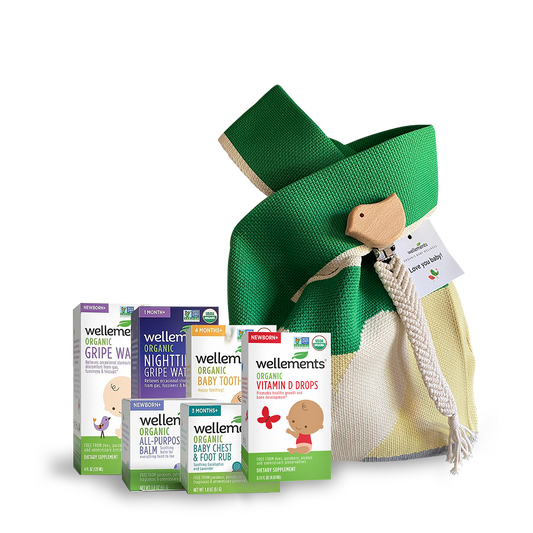The Benefits of Organic Ingredients in Baby Products
| updated:Share

As a parent, the world constantly tells you how to protect and raise your child. Marketing campaigns encourage you to give your baby one thing, while a family friend tells you to focus on another. It seems nearly impossible to get a straight answer about what is best for your child, even from doctors, because everyone wants to ensure you have autonomy.
Still, one thing that remains true throughout all the debates is that organic products, like organic baby formula, are somewhat healthier than others. Certified organic ingredients address many concerns among new parents, such as soil quality, pest and weed control, humane animal practices, and additives. Wellements brand products take the organic trend several steps further by ensuring all remedies are USDA-certified organic, free of unnecessary preservatives, and glass bottled — less of an impact on the environment.
Still, you may need to learn why organic products are so much better or how they benefit your little ones. Discover the truth.
What Are Organic Baby Products?
Certified organic baby products follow strict guidelines to use only the safest and healthiest ingredients. The substances do not use harmful chemicals, synthetic fertilizers, or pesticides during the growth or development stages.
Many regular baby products, including foods and skin and hair care products, contain synthetic fragrances, sulfates, parabens, genetically modified organisms, and other harsh chemicals. Organic products do not contain these ingredients.
Despite popular belief, chemicals, GMOs, and fragrances do not add quality or increase product safety. In some cases, all the additives can counter or limit the benefits of certain items.
Still, non-organic products are safe, according to the FDA. Your children can eat typical foods or wear non-organic clothing without significant side effects. Organic products elevate health benefits and safety.
4.6 /
5.0
(43)
43
total reviews
Newborn Bundle
Sale price
$72.00
Natural Versus Organic — What's the Difference?
Many parents assume the terms "natural" and "organic" are interchangeable and mean the same thing, but that is incorrect. While both terms concern or refer to natural ingredients, there is a critical difference: FDA regulation.
"The FDA does not wholly regulate natural" products. The only regulations these products abide by or account for are synthetic substances, flavors, and colors. Beyond minor stipulations, companies can add nearly anything to their products and label them "natural."
Organic baby clothes, food, shampoos, etc., must abide by strict regulations to receive a certified organic label. The label is the only thing that informs parents about the quality of the product. With that one small label, parents know a product contains only ingredients stemming from rigorous, healthy, and safe agricultural practices, including the absence of synthetic pesticides, fertilizers, and other chemicals.

Organic Versus Non-Organic — What's the Difference?
In today's world, beliefs balance the line between all and nothing. You have parents who swear by organic products and condemn non-organic, or you have those who swear by conventional products and condemn the expense of organic.
The truth is not so cut and dry. According to research, organic diets result in less pesticide exposure, but nutritionally, the foods are about the same as non-organic items. While exposure to pesticides and chemicals seems reason enough to choose organic over non-organic, there is little evidence that a diet comprised of regular, non-organic foods results in dangerous exposure levels.
Ultimately, the choice is up to the parent in the organic versus non-organic debate. Yes, organic foods and products are a little more expensive, but some argue safer agricultural practices require a cost increase.
Benefits of Organic Ingredients for Your Baby
When shopping for your little ones, you want to ensure you aren't a victim of "greenwashing" — branding a product as "green" without ensuring it is sustainable and healthy. Certified organic baby food and Wellements remedies abide by regulations and put in the work to ensure products are exactly as advertised, which results in many positive benefits for your little ones.
Beyond being free of chemicals and additives, organic products are typically hypoallergenic. Wellements products are also guaranteed to be free of the top eight allergens:
- Soy
- Tree nuts
- Dairy
- Eggs
- Shellfish
- Fish
- Wheat
- Peanuts
While a product may be allergen-free, the facilities where the products are made may not be. Doing your due diligence as a parent and keeping your child safe is always a good idea.
Beyond being allergen-free, most organic products are also easier on your child's system. Because organic products are easier to digest or gentler on the skin, they are often recommended for more sensitive little ones.

How Can You Check That Your Products Are Really Organic?
The only way to know a product is genuinely organic is to look for the certified organic label on the package.
Organic products are excellent options for children. As a parent, you want only what is best for your little ones. Check out Wellements shop for organic remedies and supplements to support your children.
Sources:
https://health.ucdavis.edu/blog/good-food/are-organic-foods-really-healthier-two-pediatricians-break-it-down/2019/04
https://cottoncreations.com/2016/11/28/benefits-of-organic-baby-products/
https://naturesbaby.com/blogs/trusty-tips/the-benefits-of-organic-baby-products-how-theyre-better-for-your-baby-and-the-environment
https://medium.com/disruptive-design/what-is-greenwashing-how-to-spot-it-and-stop-it-c44f3d130d5



